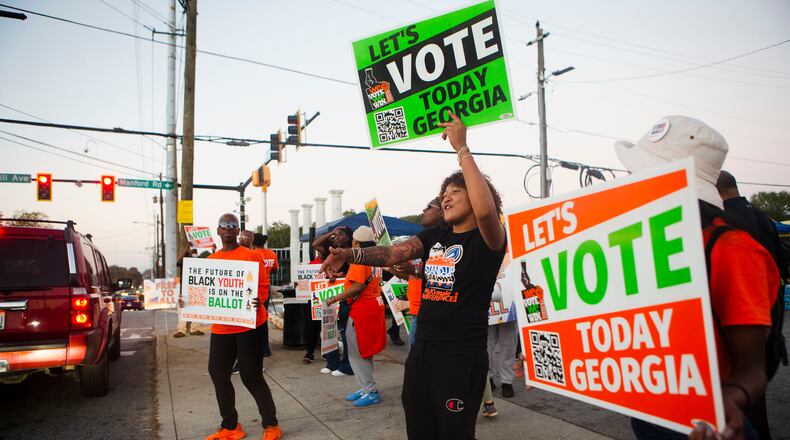Over the past 18 months, a vocal and vigorous collection of community members alleged school districts peddled smut in their libraries, blasphemed U.S. history in their classrooms and incorporated liberal dogma in their policies. They commandeered local school board meetings and warned board members to expect rebellion at the ballot box as parents sought dramatic change.
Turns out most parents prefer a few tweaks to total transformation.
The May primaries, June runoffs and last week’s general election confirmed something that rabid public-school critics won’t admit: Most parents like their public schools. No, parents don’t think their schools are perfect, but they are not in favor of scorched earth reform.
In a Gallup poll conducted in August, parents with children in K-12 expressed overall contentment with their child’s education. When asked about their own child’s education, 32% said they are completely satisfied, 48% somewhat satisfied, 14% somewhat dissatisfied and 6% completely dissatisfied.
Given all the attacks on how schools responded to COVID-19, it’s noteworthy that the 80% of parents either completely or somewhat satisfied exceeds last year’s tally of 73%. That rate also exceeds the average rate of 76% since Gallup began asking the question of parents two decades ago.
School board contests essentially upheld the status quo in metro Atlanta, with incumbents returned to office. In national races, many candidates who co-opted Republican Glenn Youngkin’s successful playbook from the Virginia governor’s race last year of blasting public schools didn’t prevail.
In his victory address after besting a Trump-supported Republican opponent who advocated decreased education funding, Illinois Gov. J.B. Pritzker said his goal was a state where “books are not banned, nor children are shielded from the truth about all of our American history.”
Voters in Michigan reelected Gov. Gretchen Whitmer, rejecting an opponent who pledged to rid schools of their “anti-American vibe.” In Wisconsin, Gov. Tony Evers prevailed over Trump-backed Republican Tim Michels, whose refrain was, “We are going to stop the CRT and get back to the ABCs.”
In Colorado, Gov. Jared Schutz Polis defeated a school choice advocate who falsely accused Colorado schools of accommodating “furries,” students who identify as cats, with litter boxes. (Among those responsible for spreading this wild tale was Colorado GOP Rep. Lauren Boebert, who holds, as of Monday, a thousand vote lead over Democratic opponent Adam Frisch in a race that may go to a recount.)
Colorado GOP gubernatorial candidate Heidi Ganahl, founder and former CEO of the pet care franchise Camp Bow Wow, said in a radio interview, “It sounds absolutely ridiculous, but it’s happening all over Colorado, and schools are tolerating it. ... Schools, put your foot down. Like, stop it. Let’s get back to teaching basics and not allow this woke ideological stuff to infiltrate our schools.”
National Education Association President Becky Pringle said, “Parents and voters explicitly rejected extreme politicians who engaged in the politics of division, politicizing our classrooms, banning books, dragging their culture wars into our public schools, and pushing failed privatization schemes.”
There were exceptions, most notably Florida, where voters awarded a big win to Gov. Ron DeSantis despite his frequent portrayal of Florida schools as hot houses of liberal dogmas and his passage of the “Don’t Say Gay” bill.
Nor did Georgia Gov. Brian Kemp seem to suffer from his endorsement of politically driven legislation limiting how race is discussed in K-12 classrooms and banning transgender girls from competing with girls’ sports teams. He easily rebuffed Democratic challenger Stacey Abrams.
After his primary battle with Trump candidate David Perdue, Kemp didn’t ballyhoo his support for these controversial measures as much, talking up instead his $5,000 teacher raise and his second-term goals to focus on learning loss, recruitment and retention in education, and school security.
Lisa Morgan, president of the 25,000-member Georgia Association of Educators, said it was likely a strategic decision by Kemp to sidestep the culture war controversies.
“Four years ago, he laid out his education plan around a teacher raise. Now, he was able to say he kept his promise,” said Morgan. “He didn’t talk about the culture war issues and was able to keep that conversation out of the forefront.”
Yet to be known is whether the conversation will return to the forefront when a new Georgia General Assembly meets in January.
About the Author
The Latest
Featured



